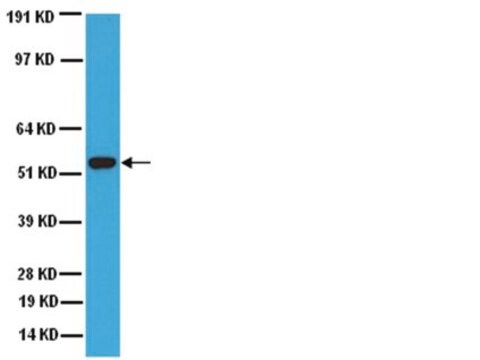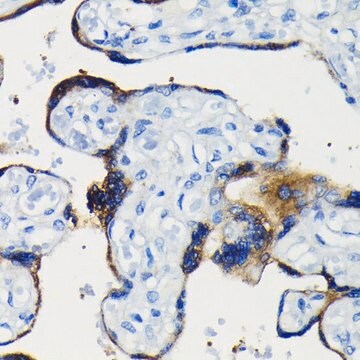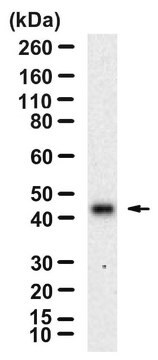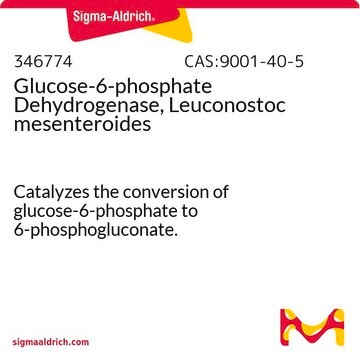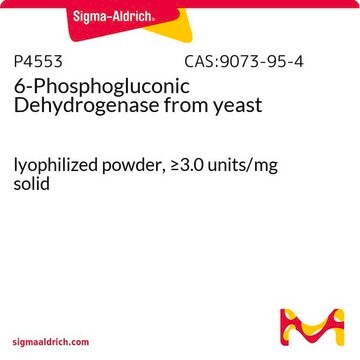General description
We are committed to bringing you greener alternative products, which adhere to one or more of the 12 Principles of Green Chemistry. This antibody is preservative-free, produced without the harm or sacrifice of animals and exceptionally stable to allow for ambient shipping and storage if needed, and thus aligns with "Waste Prevention", "Designing Safer Chemicals" and "Design for Energy Efficiency".
Click here for more information.
ZooMAb® antibodies represent an entirely new generation of recombinant monoclonal antibodies. Each ZooMAb® antibody is manufactured using our proprietary recombinant expression system, purified to homogeneity, and precisely dispensed to produce robust and highly reproducible lot-to-lot consistency. Only top-performing clones are released for use by researchers. Each antibody is validated for high specificity and affinity across multiple applications, including its most commonly used application. ZooMAb® antibodies are reliably available and ready to ship when you need them.
Specificity
Clone 1F8 is a ZooMAb® rabbit recombinant monoclonal antibody that detects Glucose-6-phosphate 1-dehydrogenase (G6PD). It targets an epitope within 16 amino acids from the N-terminal half of the protein.
Immunogen
KLH-conjugated linear peptide corresponding to 16 amino acids from the N-terminal half of human G6PD.
Application
Quality Control Testing
Evaluated by Western Blotting in A549 cell lysate.
Western Blotting Analysis: A 1:1,000 dilution of this antibody detected G6PD in A549 cell lysate.
Tested Applications
Western Blotting Analysis: A 1:1,000 dilution from a representative lot detected G6PD in HeLa, NIH/3T3, and human testis lysates.
Affinity Binding Assay Analysis: The binding affinity of this antibody to G6PD peptide was at least ten thousand-fold (10,000X) higher than that obtained with the non-specific control peptide.
Immunohistochemistry (Paraffin) Analysis: A 1:100 dilution from a representative lot detected G6PD in human bone marrow tissue sections.
Note: Actual optimal working dilutions must be determined by end user as specimens, and experimental conditions may vary with the end user
Target description
Glucose-6-phosphate 1-dehydrogenase (UniProt: P11413; also known as EC:1.1.1.49, G6PD) is encoded by the G6PD gene (Gene ID: 2539) in human. Glucose-6-phosphate 1-dehydrogenase (G6PD) plays a crucial role in glucose metabolism. G6PD catalyzes the first step in the pentose phosphate pathway, converting glucose-6-phosphate to 6-phosphoglucono- -lactone and generating NADPH in the process. G6PD is a dimeric enzyme composed of identical subunits. Each subunit consists of a catalytic domain and a coenzyme-binding domain. G6PD is widely expressed in various tissues and cell types, with higher levels observed in the liver, red blood cells, and adipose tissue. Its expression is regulated by several factors, such as hormones, cytokines, and cellular stressors. Mutations in the G6PD gene can lead to G6PD deficiency, an X-linked genetic disorder characterized by decreased enzyme activity. G6PD deficiency is the most common enzyme deficiency worldwide and can result in hemolytic anemia, especially under oxidative stress conditions. Certain variants of G6PD deficiency confer protection against malaria infection, illustrating the complex relationship between the enzyme and disease. This ZooMAb® recombinant monoclonal antibody, generated by our propriety technology, offers significantly enhanced specificity, affinity, reproducibility, and stability over conventional monoclonals.
Physical form
Purified recombinant rabbit monoclonal antibody IgG, lyophilized in PBS with 5% Trehalose, normal appearance a coarse or translucent resin. The PBS/trehalose components in the ZooMAb formulation can have the appearance of a semi-solid (bead like gel) after lyophilization. This is a normal phenomenon. Please follow the recommended reconstitution procedure in the data sheet to dissolve the semi-solid, bead-like, gel-appearing material. The resulting antibody solution is completely stable and functional as proven by full functional testing. Contains no biocide or preservatives, such as azide, or any animal by-products. Larger pack sizes provided as multiples of 25 µL.
Storage and Stability
Recommend storage of lyophilized product at 2-8°C; Before reconstitution, micro-centrifuge vials briefly to spin down material to bottom of the vial; Reconstitute each vial by adding 25 µL of filtered lab grade water or PBS; Reconstituted antibodies can be stored at 2-8°C, or -20°C for long term storage. Avoid repeated freeze-thaws.
Legal Information
ZooMAb is a registered trademark of Merck KGaA, Darmstadt, Germany
Disclaimer
Unless otherwise stated in our catalog or other company documentation accompanying the product(s), our products are intended for research use only and are not to be used for any other purpose, which includes but is not limited to, unauthorized commercial uses, in vitro diagnostic uses, ex vivo or in vivo therapeutic uses or any type of consumption or application to humans or animals.


